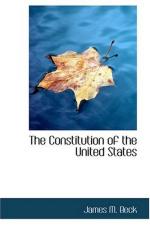“As the British Constitution is the most subtle organism which has proceeded from progressive history, so the American Constitution is the most wonderful work ever struck off, at a given time by the brain and purpose of man.”
This assumes that the Constitution sprang, like Minerva, armed cap-a-pie, from the brain of the American people, whereas it was as much the result of a slow, laborious, and painful evolution as was the British Constitution. Probably Gladstone so understood the development of the American Constitution and recognized that its framing was only the culmination of an evolution of many years.
When the constitutional struggle between the colonies and the Parliament became acute, the necessity of a union for a common defence became imperative. As early as July, 1773, Franklin recommended the “convening of a General Congress” so that the colonies would act together. His suggestion was introduced in the Virginia House of Burgesses in May, 1774, and as a result there met in Philadelphia on September 5 of that year the first Continental Congress, styled by themselves: “The Delegates appointed by the Good People of these Colonies.” Nothing was further from their purpose than to form a central government or to separate from England. This Congress only met as a conference of representatives of the colonies to defend what they conceived to be their constitutional rights.
Before the second Continental Congress met in the following year, the accidental clash at Lexington and Concord had taken place, and as the Congress again re-convened a momentous change had taken place, which was, in fact, the beginning of the American Commonwealth. The Congress became by force of circumstances a provisional government, and as such it might well have claimed plenary powers to meet an immediate exigency. So indisposed were they to separate from England or to substitute for its rule that of a new government, that the Continental Congress, when it then involuntarily took over the government of America, failed to exercise




